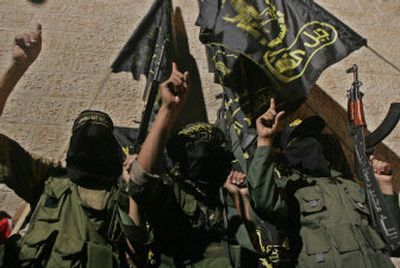Suicide bomber hits Israeli city

JERUSALEM – A Palestinian suicide bomber blew himself up outside a public bus station in the southern Israeli city of Beersheba during Sunday morning rush hour, injuring at least 10 people in the first such attack since Israel’s withdrawal from the Gaza Strip.
Israeli officials said the casualty toll would have been far higher if the driver had not identified the bomber as a potential attacker and quickly notified two security guards, who pursued the man through the city’s main bus station. The bomber eventually detonated his explosives, seriously wounding the guards and injuring at least eight other Israelis. More than two dozen others were treated at hospitals for slight injuries and shock.
Palestinian officials condemned the attack, saying it undermined Palestinian interests at a time when Israel’s withdrawal from Gaza had provided new opportunities to restart the peace process. Saeb Erekat, the chief Palestinian negotiator, said: “We call upon all to make a maximum effort in order to maintain the truce and quiet. I think the last thing Israelis and Palestinians want is to return to the cycle of violence.”
But Israeli officials said the attack highlighted the inadequacy of the Palestinian Authority’s effort to confront radical Palestinian groups, a step Israel has demanded as a condition of its return to the U.S.-endorsed peace process known as the “road map.” Although there was no immediate assertion of responsibility, a spokesman for the radical Palestinian group Islamic Jihad said on radio broadcasts that the attack brought pride to the Palestinian people.
The attack, which occurred around 8:30 a.m. and was the fourth suicide bombing this year, followed threats made Saturday by the military leader of Hamas, a larger Islamic movement also opposed to Israel’s right to exist.
Mohammed Deif, leader of the armed wing of Hamas, the Izzedine al-Qassam Brigades, warned in a videotaped message that “all of Palestine” would “become a hell” for Israelis after their departure from Gaza. Deif has been in hiding since an Israeli assassination attempt nearly three years ago.
“If you can take these two things together as a package, it emphasizes once again why we insist, and the U.S. administration insists, that the Palestinian Authority crack down on Hamas and Islamic Jihad,” said Gideon Meir, a senior Israeli Foreign Ministry official, referring to the attack and the warning. “There is no negotiating with them, no talking. This is not language they understand. Putting them under a political umbrella will not help. They must be fought.”
The attack in Beersheba, a city in the Negev region 35 miles southwest of Jerusalem, further dimmed hopes that Israel’s unilateral withdrawal from 21 Jewish settlements in Gaza and four in the northern West Bank might revive an Israeli-Palestinian peace process that has been moribund since the most recent uprising began nearly five years ago. The withdrawal, which concluded early last week, marked the first time Israel had uprooted Jewish settlements from land envisioned as part of a future Palestinian state.
The bombing came four days after Israeli special forces raided a home in the West Bank city of Tulkarm, killing five Palestinians. Israeli officials said the men were members of an Islamic Jihad cell that had helped plan two suicide bombings inside Israel this year. But Palestinian witnesses and journalists said three of those killed did not belong to the group, and Palestinian leader Mahmoud Abbas said the raid undermined peace efforts. Islamic Jihad leaders vowed to strike back.
Before Sunday’s bombing, Abbas told Israel Radio that all Palestinian armed groups would continue to adhere to a temporary truce he helped broker with Israel in February. The agreement, shaken frequently in recent months, was due to expire at the end of the year. “The truce is continuing,” Abbas said, “and it’s not linked to a time.”